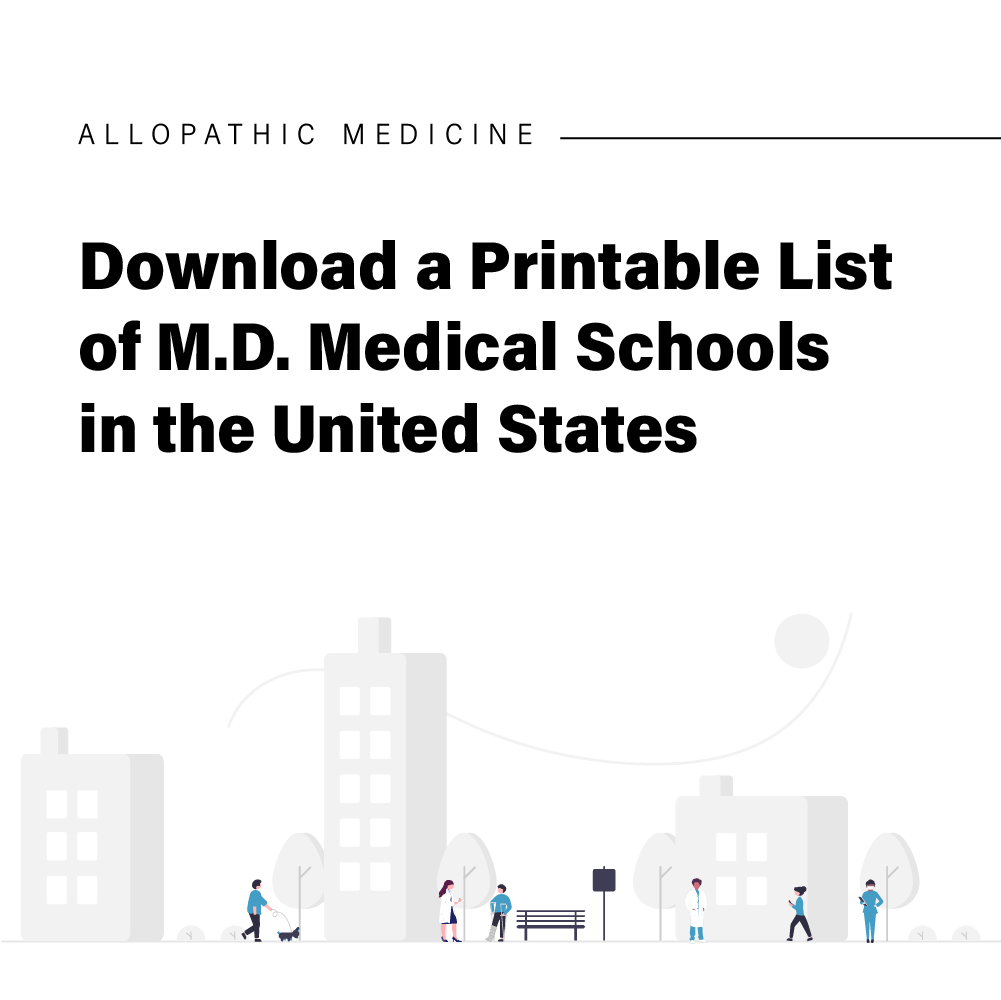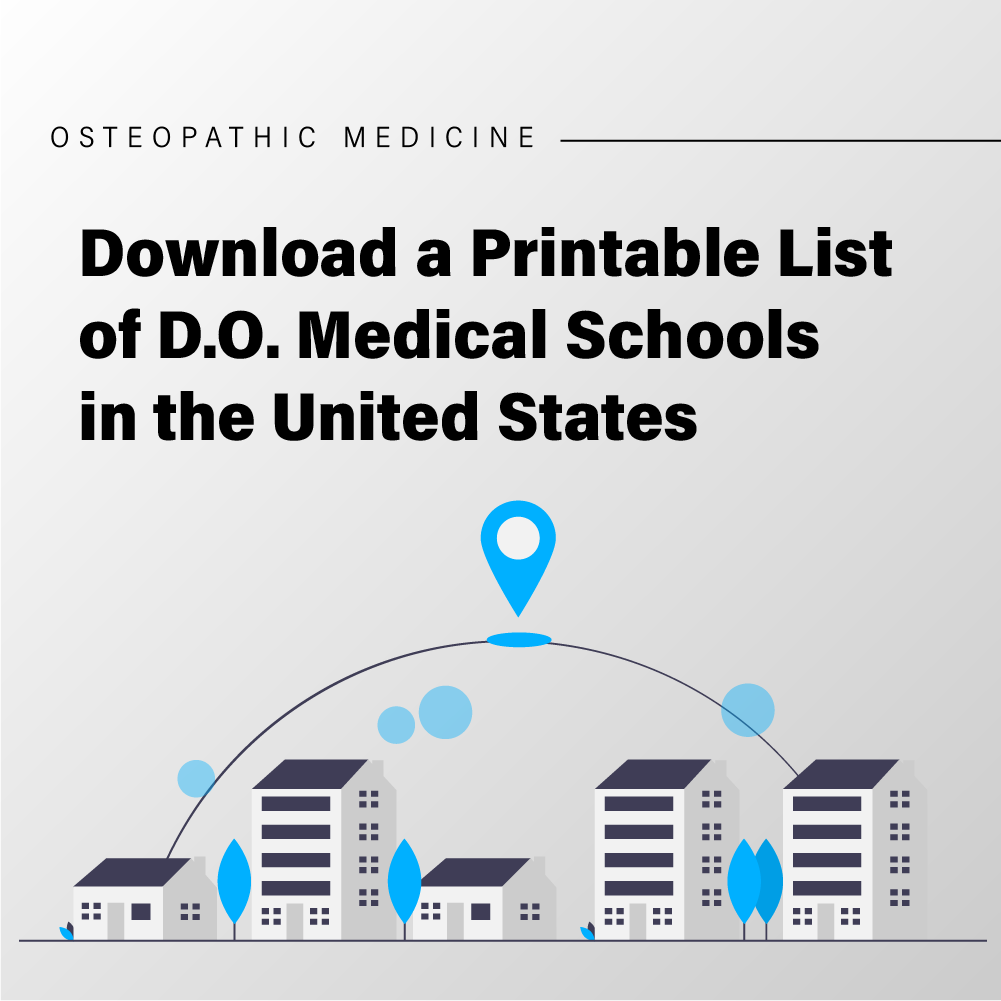An MD-PhD is a dual doctorate of medicine degree that offers students full tuition coverage for both degrees. In this guide, we will discuss everything you need to know about MD-PhD programs.
Table of Contents
- What is an MD-PhD degree?
- How long does the MD-PhD degree take to complete?
- What job opportunities are available with this degree?
- What are the salary ranges for MD-PhD career paths?
- Does the PhD degree require a specialization?
- Is an MD-PhD right for you?
- Which factors should you consider when selecting a program?
- Which medical schools offer MD-PhD degrees?
What is an MD-PhD degree?
The MD-Ph.D. is a dual doctorate of medicine and philosophy (often referred to as a medical scientist training program) that requires dissertation research in a select field of study in the biological or social sciences. The mission of this dual degree program is to train the next generation of physician-scientist leaders who represent a wide range of medical specialties and research expertise. As such, this dual degree forms leading scientists who aim to answer questions about scientific discovery, translational medicine, and medical interventions or therapeutics.
Most MD/Ph.D. programs are funded by the National Institute of Health (NIH) and offers students full tuition coverage for both degrees. Additionally, students receive a stipend and coverage for living expenses while in the program.
How long does the MD-PhD degree take to complete?
Even though the medical training portion of the degree is still 4 years, the Ph.D. dissertation often takes an additional 4 years. In total, the MD/Ph.D. degree takes 8 years to complete. Depending on the program and your research focus, you may be able to complete your dissertation research in 3 years, but this is rare.
The time commitment doubles a student’s time in medical training, without taking into consideration residency and fellowship training.
What job opportunities are available with this degree?
During the process of earning an MD/Ph.D., students will be trained to solve biomedical issues in translational or clinically-oriented research. Most MD/Ph.D. graduates work as researchers, faculty members at medical schools or universities, or as physician-scientists.
The majority of MD/Ph.D. graduates work at research institutes or teaching hospitals. Here, most career paths will lead to teaching, treating patients, research, and even administrative roles such as leading departments. The most popular medical specialties among physician-scientists are internal medicine, medical genetics, pathology, pediatrics, neurology, and surgery.
The less common (but attainable) career paths for MD/Ph.D. graduates are in medical consulting, health policy, private practice, and the biotechnology and pharmaceutical industries.
What are the salary ranges for MD/Ph.D. career paths?
Most careers for physician-scientists pay similarly to physician salaries. Careers that require administrative, research, or teaching roles may pay differently, in addition to traditional clinical salaries. Career examples and national salary ranges are:
- Principal Investigator: $65-270k
- Physician-Scientist: $177-273k
- Professor: $120-280k
- Medical Geneticist: $70-140k
- Medical Director: $219-419k
Does the Ph.D. degree require a specialization?
Yes. The doctorate of philosophy degree requires a dissertation in a specific field of study. A dissertation requires research, theory, experimentation, and plenty of technical work to complete. Typically, the dissertation is structured by an abstract model, validation of that model, experimental data to support your hypothesis, secondary confirmation studies, and a comprehensive study of future work implications from your research. All in all, the Ph.D. dissertation is the culmination of a student’s doctoral studies. Technically, this requires a written document plus a thesis defense. The thesis defense is an oral presentation in which a student summarizes their research to their medical community and a panel of Ph.D. advisors. After their presentation, students must answer questions from their advisory committee before receiving their degree.
Students in MD/Ph.D. programs pursue their doctorate degrees in a variety of fields, often in aligning with the medical specialty in which they are interested in doing their residency training. However, the Ph.D. research is nonbinding and it is possible for students to choose a different area of focus for their future medical training.
The most popular Ph.D. program areas of study in the biological sciences are:
- Genetics
- Biophysics
- Neuroscience and Cognitive Sciences
- Molecular and Cellular Biology
- Immunology
- Virology
- Genomics and Bioinformatics
- Biomedical Engineering
Some popular Ph.D. programs in the social sciences are
- Health Policy
- Sociology
- Psychology
- Anthropology
- Economics
Is an MD-PhD right for you?
Medical scientist training programs are rigorous, double the professional training time, and are truly the roads less traveled. MD/Ph.D. programs are highly selective and accept fewer students than traditional MD programs, making it harder to get into than medical school. While it may seem like an attractive idea to receive full tuition coverage, there are many factors to consider if you are thinking about pursuing an MD/Ph.D.
Are you comfortable with the time frame?
As opposed to 4 years of medical school, you will be committing to 8 years of training before you begin your residency and fellowships. This is not a career path that you can rush.
Do you have a passion for research and scientific investigation?
Completion of the MD/Ph.D. will not only require good exam scores. The Ph.D. portion of your dual degree will require resiliency, flexibility, and grit. A passion for science is vital!
Do you want to work only in research or patient care? Or both?
If you want to be a physician-scientist to treat patients and to conduct research based on your clinical work, go for it! If you prefer to be patient-focused only, the dual degree may not be necessary for you.
Are you interested in running your own research laboratory?
If you are, the MD/Ph.D. is appropriate. However, if you think you may want to do clinical research or be a part of a larger team of physicians conducting research, the Ph.D. may not be necessary for you. There are many Masters of Science programs that may be combined with your medical degree to equip you for clinical research.
Which factors should you consider when selecting a program?
This will depend on what is most important for you. Many students select programs based on location, prestige, and admission requirements–but that’s not all there is to it. Here, we offer some factors for you to consider:
- Research support: Does the program invest in research? Is the medical school adjacent to, or integrated with a research facility? Does the university invest in research faculty and investigators?
- Curriculum integration: Does the program blend your medical and research training, or keep them separate? Which would you prefer? It is considered that the best way to train physician-scientists is to integrate training as much as possible.
- Your choice of Ph.D. topic: Think about the Ph.D. program! Not every MD/Ph.D. program offers opportunities in topics outside of the biological sciences, such as engineering, economics, or the social sciences.
Which medical schools offer MD-PhD degrees?
There are 70+ MD/Ph.D. programs in the U.S., 42 of which are currently funded by the NIH in the form of Medical Scientist Training Programs (MSTP). These institutions are looking for strong academic and research credentials and excellent letters of recommendation.
Here is a list of all the medical schools that offer MD/PhD degrees:
- Albany Medical College (ALBANY MED)
- Albert Einstein College of Medicine (EINSTEIN MED)
- Baylor College of Medicine (BCOM)
- Boston University School of Medicine (BU SOM)
- Carle Illinois College of Medicine ( ILLINOIS COM)
- Case Western Reserve University School of Medicine (CWRU SOM)
- Central Michigan University College of Medicine (CMU COM)
- Chicago Medical School at Rosalind Franklin University College of Physicians and Surgeons (RFUMS)
- Cooper Medical School of Rowan University (CMSRU)
- Donald and Barbara Zucker School of Medicine (ZUCKER SOM)
- Drexel University College of Medicine (DU COM)
- Duke University School of Medicine (DUKE SOM)
- Emory University School of Medicine (EMORY MEDICINE)
- Geisel School of Medicine at Dartmouth (GEISEL MED)
- George Washington University School of Medicine (GW SMHS)
- Harvard Medical School (HARVARD MED)
- Howard University College of Medicine (HOWARD COM)
- Icahn School of Medicine at Mount Sinai (ICAHN MOUNT SINAI)
- Indiana University School of Medicine (IU SOM)
- Jacob School of Medicine and Biomedical Sciences at University of Buffalo (JACOB MED UB)
- John Hopkins University and School of Medicine (HOPKINS SOM)
- Kaiser Permanente Bernard J Tyson School of Medicine (KP SOM)
- Keck School of Medicine at the University of Southern California (KECK MED USC)
- Lewis Katz School of Medicine at Temple University (TEMPLE MS)
- Louisiana State University School of Medicine in New Orleans (LSU HEALTH NO)
- Louisiana State University School of Medicine in Shreveport (LSU SOM)
- Loyola University Chicago Stritch School of Medicine (LOYOLA HSD SOM)
- Marshall University Joan C Edwards School of Medicine (MUSOM)
- Mcgill University Faculty of Medicine and Health Sciences (MCGILL MED)
- Mcgovern Medical School at the University of Texas Health Science Center at Houston (MCGOVERN MED)
- Medical College of Georgia at Augusta University (MCG)
- Medical College of Wisconsin (MCW)
- Medical University of South Carolina College of Medicine (MUSC COM)
- Meharry Medical College (MEHARRY MEDICAL)
- Michigan State University College of Human Medicine (MSUMD)
- Morehouse School of Medicine (MSM)
- New York University Grossman School of Medicine (NYU GROSSMAN SOM)
- Northwestern University of Feinberg School of Medicine (NU FEINBERG SOM)
- Ohio State University College of Medicine (OSU COM)
- Oregon Health Science University School of Medicine (OHSU SOM)
- Perelman School of Medicine at University of Pennsylvania (PENN STATE COM)
- Rutgers New Jersey Medical School (NJMS)
- Rutgers Robert Wood Johnson Medical School (RWJMS)
- Saint Louis University School of Medicine (SLU SOM)
- Stanford University School of Medicine (STANFORD MED)
- State University of New York Downstate Medical Center College of Medicine (SUNY DOWNSTATE MED)
- Texas A&M Health Science Center College of Medicine (TAMU COM)
- Texas Tech University Health Sciences Center School of Medicine at Lubbock (TTUHSC)
- University of Texas Health Science Center at San Antonio Joe R and Teresa Lozano Long School of Medicine (UT HEALTH SA SOM)
- University of Toledo College of Medicine and life Sciences (U of TOLEDO COM)
- Tufts University School of Medicine (TUFTS MED)
- Uniformed Services University of Health Sciences F. Edward Herbert School of Medicine (UCUHS)
- University of Alabama School of Medicine (UAB SOM)
- University of Alberta Faculty of Medicine and Dentistry(UALBERTA MED)
- University of Arizona College of Medicine Tucson(UAZ COM)
- University of Arizona College of Medicine Phoenix(MEDICINE PHOENIX)
- University of Arkansas for Medical Science College of Medicine (UAMS)
- University of British Columbia Faculty of Medicine (UBC MED)
- University of California, Davis School of Medicine(UC Davis SOM)
- University of California, Irvine School of Medicine (UCI SOM)
- University of California, Los Angeles, David Geffen School of Medicine (UCLA SOM)
- University of California, San Diego School of Medicine (UCSD SOM)
- University of California, San Francisco School of Medicine (UCSF SOM)
- University of Central Florida, College of Medicine (UCF COM)
- University of Illinois College of Medicine (UI COM)
- University of Iowa Roy J. and Lucille A. Carver College of Medicine (IOWA COM)
- University of Kansas School of Medicine (KU SOM)
- University of Kentucky College of Medicine (UK COM)
- University of Louisville School of Medicine (UL SOM)
- University of Massachusetts Medical School (U MASS MEDICAL)
- University of Miami Leonard M Miller School of Medicine (U MIAMI SOM)
- University of Mississippi School of Medicine (UM SOM)
- University of Missouri-Columbia School of Medicine (MU SOM)
- University of Nebraska College of Medicine (UNMC)
- University of Nevada, Reno, School of Medicine (UNR SOM)
- University of North Carolina School of Medicine (UNC SOM)
- University of Oklahoma College of Medicine (OU Med)
- University of Ottawa Faculty of Medicine (U OTTAWA MED)
- University of Pittsburgh School of Medicine (PITT SOM)
- University of Rochester School of Medicine and Dentistry (U ROCHESTER MED)
- University of South Carolina School of Medicine Columbia (UofSC SOM)
- University of Texas Medical Branch School of Medicine (UTMB SOM)
- University of Texas Rio Grande Valley School of Medicine (UTRGV SOM)
- University of Texas Southwestern Medical School (UTSW)
- University of Utah School of Medicine (UofU SOM)
- University of Washington School of Medicine (UW SOM)
- University of Wisconsin School of Medicine and Public Health (UWSMPH)
- USF Health Morsani College of Medicine (USF HEALTH)
- Virginia Commonwealth University School of Medicine (VCU SOM)
- Wake Forest School of Medicine of Wake Forest Baptist Medical Center (WAKE FOREST SOM)
- Washington University in St Louise School of Medicine (WUSTL SOM)
- Wayne State University School of Medicine (WAYNE SU SOM)
- West Virginia University School of Medicine (WVU SOM)
- Western Michigan University Homer Stryker MD School of Medicine (WMU SOM)
- Wright State University Boonshoft School of Medicine (WSU BOONSHOFT SOM)
- Yale School of Medicine (Yale MD)
Further Reading
MD-JD Dual Degree Programs List and Information 2023



